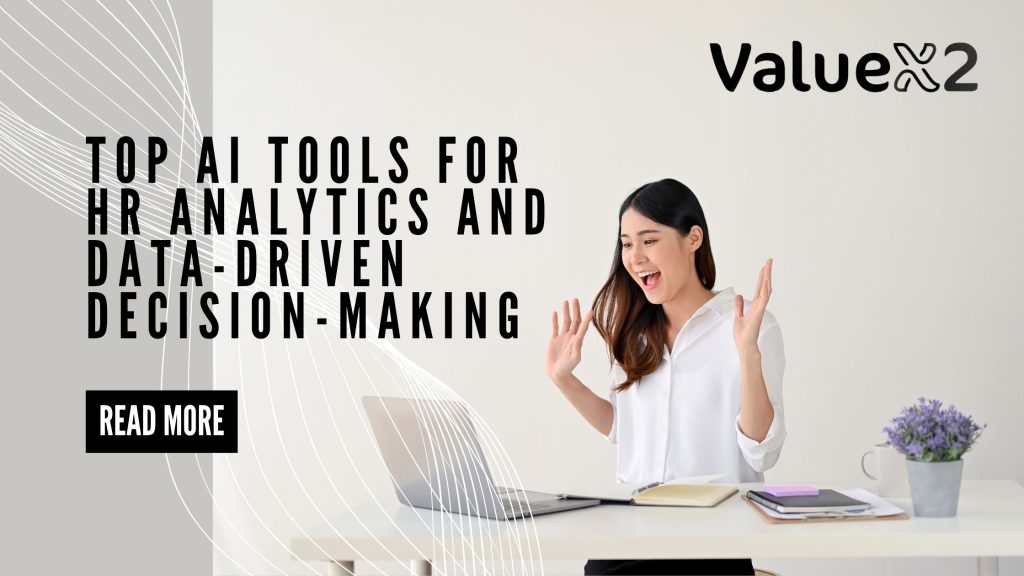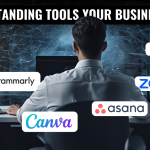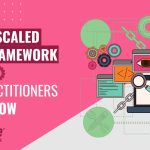Learn about the best AI tools for Human Resources analytics and data-driven decision-making.

The management of Human Resources (HR) has undergone a lot of changes over the past years majoring in the issue of technology that has influenced the change of traditional practices. Today, AI tools have taken the front line and have continued to promote the change of using data in the HR department to make critical decisions. This blog aims to focus in detail on the most important tools in the use of artificial intelligence in analysis for the human resource department of organizations and decision-making for effective strategic human resource management.
AI-based analysis enables HR specialists to stop using guesses and assumptions and select concrete strategies and solutions along with their positive impact on the organization. AI can help the HR departments to improve the efficiency of the entire recruitment process, engage the employees and guarantee that training and development needs match the employee’s and employer’s requirements. This now reduces the role of intuition in decision-making not as a fad but as a need in today’s business climate where companies have to constantly adapt.
Below are some of the top AI tools that help in human resource analytics and provide insights into data-driven decision-making.
IBM Watson Talent
The role of IBM Watson Talent is to provide people’s management with an AI-based set of tools aimed at improving HR solutions. Essentially, Watson Talent extracts data from CVs as well as social media profiles, then applies NLP and machine learning to rate the candidate’s likely performance in their respective jobs. It also offers individual employment advice and analysis of staff member’s satisfaction levels with the firm.
Features: Staff acquisition and candidate search, application tracking system for workforce management, motivation and turnover rates calculations, and career planning for the workforce.
Benefits: They also include better talent selection, greater employee satisfaction, and performance, and effective decision-making based on available data.
HireVue
It is a video interviewing and assessment software set that has incorporated Artificial Intelligence technology to assist HR professionals in the hiring process. The work platform incorporates the use of artificial intelligence in the evaluations of video interviews, the performance scoring of the candidate responses as well as job performance predictions. However, HireVue also has features for candidate engagement and to be able to determine who the best candidates are.
Features: Video interviewing and screening, talent measurement and evaluation, AI-based forecast of work productivity
Benefits: Reduction of the number of people in the hiring process, a better way of selecting candidates and also an efficient way of using analysis to make better decisions.
Eightfold AI
Eightfold AI is a talent intelligence platform that applies artificial intelligence to give insights into workforce data of the four areas of talent. The platform leverages deep learning methods for defining skills that are required, for suggesting one’s career progression, and for forecasting performance. They also offer analyses regarding diversity and inclusion strategies.
Features: Talent acquisition and retention analytics, My Career, D&I intelligence
Benefits: Optimised measures for attraction and retention of talents, supplemented methods for the development and maintenance of employee engagement and motivation, work-related diversity and inclusion initiatives based on quantitative research
Visier
Currently, Visier is an artificial intelligence-based extensive approach for analysing workforce data that offers profound HR alternatives to several field professionals. The platform refers to the analysis of the employees’ data, with the intent to understand trends in the workforce while being able to predict the future demands for employees and the subsequent alignment of the appropriate strategies. Another aspect of the organizational culture that can be determined by Visier is the level of employee engagement, turnover and productivity.
Features: Demographic Statistics and Forecasting, Employee Attitude and Turnover Trends, HR Processes and Initiatives Effectiveness
Benefits: Better strategy and design of the workforce, better management in employee attraction and satisfaction and better decision-making.
Workday
Workday is a comprehensive Human Resource management suite that leverages Artificial Intelligence to analyze the workforce and streamline Human Resource procedures. It provides the means for recruitment, appraisals, and learning & development of the employees. With Workday’s cognitive capabilities, HR leaders can discover patterns and forecast the right mix of employee talent required in the future, all while building sound global hr strategies.
Features: Talent acquisition and performance management, development and engagement measurement, prediction and measurement concerning staff.
Benefits: Better recruitment and training, higher productivity, and efficiency of employees, comprehensive goals for HR practices
Pymetrics
Pymetrics will rely on video-game-like exercises and artificial intelligence for evaluating the characteristics to hire employees. The platform organizes people into positions for which they might work most effectively given their essential nature. Pymetrics does not necessarily rely on prior experience like most HR management systems but is fair and looks at the capacity an individual has before being shaped by the environment.
Features: Neuroscience-based tests and assessments, candidate-jobs matching with less bias
Benefits: Diversified talent pool, refining company-candidate match, data-driven organization
Humu
Humu is an AI-based people management tool that is designed to enhance the company’s employees’ productivity based on behavioural economics. The platform also has the feature of issuing ‘microbes’ to employees and managers to foster desirable behaviours and practices. Humu gathers data from any interactions and feedback from the company’s employees and provides recommendations on what should be done to promote their satisfaction and efficiency.
Features: Promotion techniques, organizational behaviour, other engagement analysis, and recommendations for performance enhancement
Benefits: Higher level of employee initiative, better experience in the workplace, application of the results of analyzing organizational effectiveness
Peakon (currently a subsidiary of Workday)
Peakon is a tool for monitoring the engagement of employees with the use of artificial intelligence tools to get and sort the opinions of the employees in real time. The tool offers information concerning morale, satisfaction, and what may require attention in the workforce. Based on the feedback and the advanced analytics, which are provided to the user, Peakon enables HR professionals to gain oversight into the employees’ situation and take meaningful actions to enhance the process.
Features: Current feedback capture, emotional states, employees’ communication and productivity data
Benefits: Engagement levels are enhanced, Common Problem prevention strategies for the company, evidence-based human capital management
ALSO READ: TRANSFORMING HR OPERATIONS WITH AGILE PRINCIPLES: A GUIDE TO IMPLEMENTING AGILE HR PRACTICES
The Role of AI in HR Management
Through defining the concepts, it is possible to conclude that AI can bring significant improvements and transformation to HR operations with agile principles, as it will along with automation of the majority of processes, improve the decision-making system and provide valuable data regarding the employees. Using AI, large amounts of data can be analyzed and looked for specific patterns and trends and provide valuable recommendations to the decision-makers, thus easing the work of the HR professionals.
Strategic human resource management (SHRM) is critically supported by AI tools since they supply analytical data that enables the strategizing of the most appropriate approaches for attracting, maintaining, and nurturing talented personnel. Through these tools, HR professionals can predict the needs of its workforce and determine the gaps that need to be filled through training.
Adaptive software development is an agile process which is considered highly valuable in the process of HR management because of its iterative processes, flexibility and focus on matters of collaboration. With change taking place in every organization from time to time and with employees’ constantly evolving needs, such a model helps the HR teams to adapt quickly. Adaptive software development is made easy by AI tools as they supply data and analytics and thus enable efficient decision-making by HR professionals for the adaptation of strategies.
Hence, training and development are considered noble activities in human resource management. AI tools are useful in the improvement of training programs since they can analyze data relating to employee performance, determine areas of deficiency in terms of skills, and suggest training programs that could be suitable for the particular employee. There are also some benefits for the concept of training such as the assessment tools can reveal the success rate of training programs to guide the HR specialists in their adjustment of training plans.
To build more understanding about applying the agile methodologies in the HR function, an Agile HR certification may be useful. The following certifications can equip anyone with the important information and techniques necessary to implement agile in their HR system. To get more information about Agile HR certifications and their advantages, check this out.
The Impact of AI on Strategic HR Management
Strategic HR management benefits from using AI tools since the tools generate insights to be used in the formulation of strategies by HR practitioners. Here are some key areas where AI is making a difference:
Talent Acquisition
The routine use of the instruments in the acquisition of talents enhances efficiency in qualification and behavioural patterns match job performance prognosis and talent discovery. Organizations benefit from such tools by letting the HR professionals make proper and efficient decisions, minimize the prejudice factor in hiring practices, and enhance the standard of the candidates being hired.
Employee Engagement
The application and use of AI in engagement analysis enables the engagement levels among employees to be compared and factors that contribute to engagement to be determined by the HR professionals to formulate engagement interventions. Therefore, even in a simple analysis of general information, A good strategic HR manager can identify the employee’s feelings and behaviour, which are crucial for providing a favourable working climate and improving the satisfaction of the staff.
Training & Development
AI applications improve training and development processes by diagnosing the deficiencies in know-how, suggesting learning solutions, and evaluating the impact of the training. For instance, these tools help HR professionals develop the right churn training that could help address the issues which hinder the employees’ efficiency, thereby promoting their career enhancement.
Performance Management
Modern methods of using artificial intelligence in performance management are applied to evaluate performance, find out trends in employees’ data, and recognize possible issues regarding performance. The application of these tools assists the HR personnel in designing performance management systems that are goal-oriented, providing strategies aiming to give appropriate feedback on employees’ performances.
Diversity & Inclusion
Organisational diversity and inclusion are eased by the use of artificial intelligence tools. These tools work by evaluating the statistics related to the workforce: this reveals diversity indices, shows where changes can be made, and allows the SHRM to devise the right diversity and pluralism policies based on the results acquired.
Enhance Knowledge with ValueX2
ValueX2 offers a diverse range of courses that enhance knowledge in Scrum, Kanban, Artificial Intelligence, ICAgile, SAFe, and more. These courses equip professionals with practical skills and insights to implement agile methodologies effectively, driving organizational efficiency and continuous improvement.
Conclusion
AI is changing the approach of HR management in organizations by applying analytical data that improves the decision-making process as well as the optimization of strategies in the management of employees. Every process of HR, right from identification of talents and engaging them to training and developing them can be supported by AI analytics which provides the much-required insights to the HR professionals to make informed decisions that help realize organizational objectives.
Thus, as organisations are increasingly moving to digital worlds, AI is going further in HR Management. Through the use of these advanced tools, the role of HR professionals will be more meaningful and effective when managing the present day’s organizational challenges and ensuring strategic organizational development. Thus, by monitoring the latest trends and incorporating new approaches, HR leaders are capable of maintaining competitiveness despite the constant changes taking place at workplaces through their hr leadership strategies.
The application of artificial intelligence and the implementation of agile processes enable HR specialists to remain relevant in the constantly changing field of managing human capital.
ALSO READ: BENEFITS OF AN AGILE HR CERTIFICATION

Sagar is an HR Agile Coach & Business Agility Consultant with over a decade of experience in HR functions at small and large multinational corporations. He has been running an HR consulting firm for the last few years, focusing on leveraging agile methods to increase business efficiency.
Sagar is an authorized instructor for ICAgile Agility in HR (ICP-AHR) and Business Agility Foundations (ICP – BAF) training courses. He has considerable experience in coaching and training on applying agile practices for his clients, primarily HR departments. He also provides consulting for HR for Agile and Agile for HR transformation to corporates.






